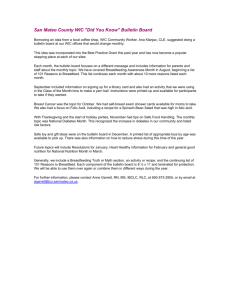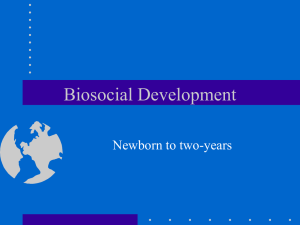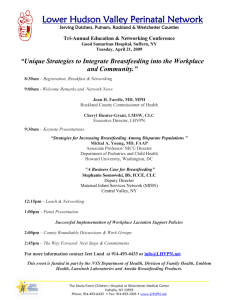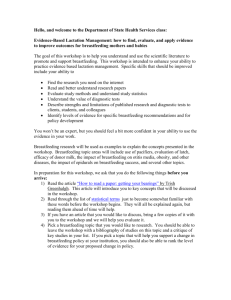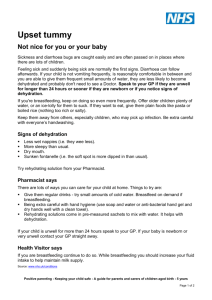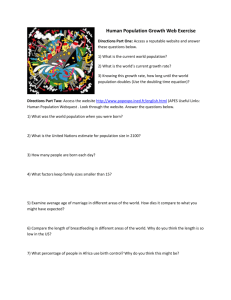April 10, 2015
advertisement
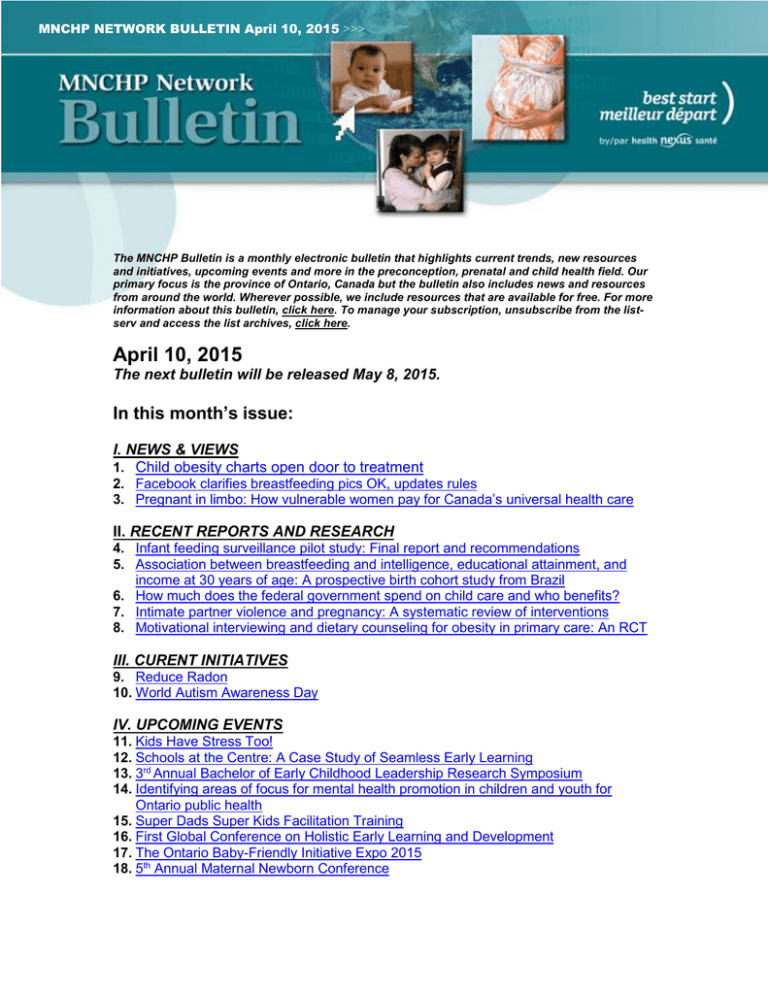
MNCHP NETWORK BULLETIN April 10, 2015 >>> The MNCHP Bulletin is a monthly electronic bulletin that highlights current trends, new resources and initiatives, upcoming events and more in the preconception, prenatal and child health field. Our primary focus is the province of Ontario, Canada but the bulletin also includes news and resources from around the world. Wherever possible, we include resources that are available for free. For more information about this bulletin, click here. To manage your subscription, unsubscribe from the listserv and access the list archives, click here. April 10, 2015 The next bulletin will be released May 8, 2015. In this month’s issue: I. NEWS & VIEWS 1. Child obesity charts open door to treatment 2. Facebook clarifies breastfeeding pics OK, updates rules 3. Pregnant in limbo: How vulnerable women pay for Canada’s universal health care II. RECENT REPORTS AND RESEARCH 4. Infant feeding surveillance pilot study: Final report and recommendations 5. Association between breastfeeding and intelligence, educational attainment, and income at 30 years of age: A prospective birth cohort study from Brazil 6. How much does the federal government spend on child care and who benefits? 7. Intimate partner violence and pregnancy: A systematic review of interventions 8. Motivational interviewing and dietary counseling for obesity in primary care: An RCT III. CURENT INITIATIVES 9. Reduce Radon 10. World Autism Awareness Day IV. UPCOMING EVENTS 11. Kids Have Stress Too! 12. Schools at the Centre: A Case Study of Seamless Early Learning 13. 3rd Annual Bachelor of Early Childhood Leadership Research Symposium 14. Identifying areas of focus for mental health promotion in children and youth for Ontario public health 15. Super Dads Super Kids Facilitation Training 16. First Global Conference on Holistic Early Learning and Development 17. The Ontario Baby-Friendly Initiative Expo 2015 18. 5th Annual Maternal Newborn Conference MNCHP NETWORK BULLETIN April 10, 2015 >>> V. RESOURCES 19. 6th International Conference on Fetal Alcohol Spectrum Disorder 20. Introduction to Public Health Ethics 2 & 3 21. Resources about Newborn Screening 22. Parenting in Ottawa 23. Building Resiliency through Family-Based Programming 24. Recent videos VI. FEATURED BEST START RESOURCES 25. It Takes a Village: Taking Action for Healthy Children 26. Addressing Smoking with Women and their Families: Strategies for In-home Support Services 27. Best Start Resource Centre Displays I. NEWS & VIEWS 1. Child obesity charts open door to treatment This article and accompanying video report (CBC News, 2015, Mar. 30) provides highlights from new guidelines recently released by the Canadian Task Force on Preventive Health Care to help doctors provide appropriate treatment for children and youth who are obese or overweight. The guidelines can be accessed online through CMAJ. While the Task Force recommends that family doctors track the weight of any patients under the age of 17, they caution against taking any measures to prevent weight gain in children or youth who are not currently overweight. The guidelines also emphasize the importance of a holistic approach to obesity prevention in which the focus is on health, not weight. Rather than promote drug treatments, the Task Force encourages family doctors to refer at-risk patients to structural behavioural programs. Ultimately, the Task Force underlines that doctors cannot work in a vacuum to prevent obesity, and that support of a patient’s family and community is necessary for treatment to be successful. http://www.cbc.ca/news/health/child-obesity-charts-open-door-to-treatment-1.3014832 Related articles: Get the entire family involved in tackling childhood obesity: Canadian report: Reporting on the guidelines released by the Canadian Task Force on Preventive Health Care, this article (Chai, 2015, Mar. 30) highlights the important role of family involvement in combating childhood obesity. http://globalnews.ca/news/1911163/get-the-entire-family-involved-in-tacklingchildhood-obesity-canadian-report/ The cure for childhood obesity parents will hate: This blog post from Dr. Brian Goldman (2015) questions the impact of the Canadian Task Force on Preventive Health Care guidelines which are aimed at family physicians and Page |2 MNCHP NETWORK BULLETIN April 10, 2015 >>> instead promotes interventions that schools and parents can take to promote healthy weights. http://www.cbc.ca/radio/whitecoat/blog/the-cure-for-childhood-obesity-parentswill-hate-1.3014981?cmp=rss 2. Facebook clarifies breastfeeding pics OK, updates rules Reporting on recent protests from mothers who had images of breastfeeding removed from Facebook, this article (CBC News, 2015, Mar. 16) announces Facebook’s recent release of new rules that clearly provide permission for users of the site to post breastfeeding images. The social media site’s new rules accommodate a new trend popular among breastfeeding mothers of taking breastfeeding selfies or “brelfies” to promote the natural feeding method. http://www.cbc.ca/news/world/facebook-clarifies-breastfeeding-pics-ok-updates-rules1.2997124 3. Pregnant in limbo: How vulnerable women pay for Canada’s universal health care This episode of Day 6 with Brent Bambury brings to light the large number of pregnant women in Canada who are currently living without provincial health insurance and highlights the importance of allowing these women access to free prenatal care. Throughout the report, Bambury relays the stories of three women who experienced pregnancy or childbirth without insurance and their fear of being able to afford the care necessary to have a safe and healthy pregnancy. http://www.cbc.ca/radio/day6/episode-226-pilots-and-mental-illness-dot-sucks-andpregnant-in-limbo-1.3009231/pregnant-in-limbo-how-vulnerable-women-pay-for-canadas-universal-health-care-1.3009289 II. RECENT REPORTS AND RESEARCH * indicates journal subscription required for full text access 4. Infant feeding surveillance pilot study: Final report and recommendations Haile, R., Procter, T. D., Alton, G. D. et al. on behalf of LDCP Breastfeeding Surveillance Project Team. (2015). Infant feeding surveillance pilot study: Final report and recommendations. Woodstock, Ontario, Canada. EXECUTIVE SUMMARY: Page |3 MNCHP NETWORK BULLETIN April 10, 2015 >>> The Infant Feeding Surveillance Pilot Study was a two-year project funded by Public Health Ontario’s Locally Driven Collaborative Project (LDCP) program. Of the 36 public health units (PHUs) in Ontario, 27 collaborated on this project. Breastfeeding is an important determinant of health and has been associated with significant health benefits for both children and mothers (Public Health Agency of Canada, 2014). As such, the Ministry of Health and Long-Term Care, Health Promotion Division has included Baby-Friendly Initiative (BFI) status as a Public Health Funding & Accountability Agreement Indicator since 2011. Part of the requirements to obtain BFI designation includes the collection of infant feeding data related to breastfeeding initiation, exclusivity and duration. Currently, no standardized infant feeding surveillance data are available in Ontario. The objective of this project was to work collaboratively with Ontario PHUs to determine the feasibility of developing a standardized tool and method for collecting infant feeding surveillance data that would enable PHUs to have locally useful and externally comparable data. The project was a multi-phasic study including: 1) situational assessment; 2) development/adaptation of a tool and data collection methods; 3) pilot-testing of tool and data collection methods; 4) pilot evaluation; and 5) summary, recommendations and dissemination. The pilot was conducted at seven PHUs in Ontario from September 2013 – September 2014. The pilot collected both qualitative and quantitative data and was evaluated based on the following themes: response rates and timeliness, data quality, accuracy and completeness, simplicity and cost, questionnaire relevance and function, representativeness of various priority populations, lessons learned and suggestions for improvement, and compliance with BFI data requirements. Overall, the results of the pilot had positive results. Pilot public health units (PPHUs) cited that taking part in this project aided their abilities to collect consistent data for BFI designation, as well as allowed them to reach out to mothers and identify issues pertaining to breastfeeding in their respective regions. Results of the pilot, and discussions with key public health stakeholders, including the Breastfeeding Committee for Canada (BCC) Assessment Committee, led to the development of recommendations related to time points, sampling, consent, contact method, contact window, contact attempts, questionnaire, intervention, and analysis. For full-text access, please contact Gillian Alton at ldcpbreastfeeding@oxfordcounty.ca 5. Association between breastfeeding and intelligence, educational attainment, and income at 30 years of age: A prospective birth cohort study from Brazil Victora, C. G., Horta, B. L., Loret de Mola, C., Quevedo, L., Tavarez Pinheiro, R., Gigante, D. P., Gonçalves, H., Barros, F. C. (2014). Association between breastfeeding and intelligence, educational attainment, and income at 30 years of age: A prospective birth cohort study from Brazil. Retrieved from http://press.thelancet.com/breastfeedingIQ.pdf SUMMARY: Page |4 MNCHP NETWORK BULLETIN April 10, 2015 >>> Background: Breastfeeding has clear short-term benefits, but its long-term consequences on human capital are yet to be established. We aimed to assess whether breastfeeding duration was associated with intelligence quotient (IQ), years of schooling, and income at the age of 30 years, in a setting where no strong social patterning of breastfeeding exists. Methods: A prospective, population-based birth cohort study of neonates was launched in 1982 in Pelotas, Brazil. Information about breastfeeding was recorded in early childhood. At 30 years of age, we studied the IQ (Wechsler Adult Intelligence Scale, 3rd version), educational attainment, and income of the participants. For the analyses, we used multiple linear regression with adjustment for ten confounding variables and the Gformula. Findings: From June 4, 2012, to Feb 28, 2013, of the 5914 neonates enrolled, information about IQ and breastfeeding duration was available for 3493 participants. In the crude and adjusted analyses, the durations of total breastfeeding and predominant breastfeeding (breastfeeding as the main form of nutrition with some other foods) were positively associated with IQ, educational attainment, and income. We identified doseresponse associations with breastfeeding duration for IQ and educational attainment. In the confounder-adjusted analysis, participants who were breastfed for 12 months or more had higher IQ scores (difference of 3·76 points, 95% CI 2·20–5·33), more years of education (0·91 years, 0·42–1·40), and higher monthly incomes (341·0 Brazilian reals, 93·8–588·3) than did those who were breastfed for less than 1 month. The results of our mediation analysis suggested that IQ was responsible for 72% of the effect on income. Interpretation: Breastfeeding is associated with improved performance in intelligence tests 30 years later, and might have an important effect in real life, by increasing educational attainment and income in adulthood. http://press.thelancet.com/breastfeedingIQ.pdf Related resource: Newly published breastfeeding study from Brazil: Hear from an expert: Listen to a short audio clip from Dr. Colin Michie, Chair of the Royal College of Paediatrics and Child Health’s Nutrition Committee, where he discusses the implications of this seminal breastfeeding study and how health practitioners can share the results of the study with mothers. http://blogs.unicef.org.uk/2015/03/24/baby-friendly-brazil-study-comment/ 6. How much does the federal government spend on child care and who benefits? Malanik, C. (2015). How much does the federal government spend on child care and who benefits? Ottawa, ON: Officer of the Parliamentary Budget Officer. Retrieved from http://www.pbo-dpb.gc.ca/files/files/Child_Care_EN.pdf ABSTRACT: In 2013-2014, Canadian families spend $5.7 billion in child care expenses. This represents 5 per cent of the average Canadian family’s total household expenses. Page |5 MNCHP NETWORK BULLETIN April 10, 2015 >>> The federal government has two initiatives explicitly and directly linked to defraying the costs of child care expenses, the Universal Child Care Benefit (UCCB) and the Child Care Expense Deduction (CCED). The value of child care benefits grew from $0.6 billion in 2004-2005 to approximately $3.3 billion in 2013-2014. This amounted to three-fifths (59%) of what Canadian families were spending on child care in 2013-2014. Families with young children (less than 13 years of age) spending money on child care received two-thirds (66%) of these benefits. The remaining 34 per cent was distributed to families with no child care expenses and families with older children. As a share of housholds’ aggregate child care expenses, federal benefits represented roughly 42 per cent and 247 per cent respectively. The federal government announced enhancements to the UCCB and CCED in October 2014. If Parliament approved these proposed enhancements, PBO estimates the fiscal impact of federal child care policies will increase to roughly $7.7 billion from the 20132014 value of $3.3 billion. By 2017-2018, it will grow to roughly $7.9 billion. These proposals would also change the allocation of benefits. In 2015, 49 per cent of these benefits would go to families with child care expenses and young children, and the remaining 51 per cent to families with no child care expenses and families with older children. Since families with young children spend more on child care, but will receive roughly half (49%) of the federal child care benefits in 2015-2016, their share will only cover 67 per cent of the amount they will spend on child care. Conversely, benefits that families with older children will receive from the government in 2015-2016 will represent nearly eight times the amount they will spend on child care. http://www.pbo-dpb.gc.ca/files/files/Child_Care_EN.pdf Related articles: Families without child care costs get most of Tories’ enhanced child care spending, budget officer says: This article (Whittington, 2015) highlights the key findings of the PBO’s report, emphasizing that the new enhancements to the Universal Child Care Benefit would primarily benefit those without child care expenses. http://www.thestar.com/news/canada/2015/03/31/families-without-child-carecosts-get-most-of-tories-child-care-spending-budget-officer-says.html Federal spending on child care to almost double: Budget watchdog: This article (Press, 2015) showcases views on the PBO’s report from government officials and childcare advocates, with childcare experts stating that doubling federal spending on child care does not necessarily address the issue of providing quality child care. http://ottawacitizen.com/news/politics/federal-spending-on-child-care-to-almostdouble-budget-watchdog 7. Intimate partner violence and pregnancy: A systematic review of interventions Page |6 MNCHP NETWORK BULLETIN April 10, 2015 >>> Van Parys, A., Verhamme, A., Temmerman, M., & Verstraelan, H. (2015). Intimate partner violence and pregnancy: A systematic review of interventions. PLoS ONE, 9(1), E85084. doi:10.1371/journal.pone.0085084 ABSTRACT: Background: Intimate partner violence (IPV) around the time of pregnancy is a widespread global health problem with many negative consequences. Nevertheless, a lot remains unclear about which interventions are effective and might be adopted in the perinatal care context. Objective: The objective is to provide a clear overview of the existing evidence on effectiveness of interventions for IPV around the time of pregnancy. Methods: Following databases PubMed, Web of Science, CINAHL and the Cochrane Library were systematically searched and expanded by hand search. The search was limited to English peer-reviewed randomized controlled trials published from 2000 to 2013. This review includes all types of interventions aiming to reduce IPV around the time of pregnancy as a primary outcome, and as secondary outcomes to enhance physical and/or mental health, quality of life, safety behavior, helpseeking behavior, and/or social support. Results: We found few randomized controlled trials evaluating interventions for IPV around the time of pregnancy. Moreover, the nine studies identified did not produce strong evidence that certain interventions are effective. Nonetheless, home visitation programs and some multifaceted counseling interventions did produce promising results. Five studies reported a statistically significant decrease in physical, sexual and/or psychological partner violence (odds ratios from 0.47 to 0.92). Limited evidence was found for improved mental health, less postnatal depression, improved quality of life, fewer subsequent miscarriages, and less low birth weight/prematurity. None of the studies reported any evidence of a negative or harmful effect of the interventions. Conclusions and implications: Strong evidence of effective interventions for IPV during the perinatal period is lacking, but some interventions show promising results. Additional large-scale, high-quality research is essential to provide further evidence about the effect of certain interventions and clarify which interventions should be adopted in the perinatal care context. http://www.ncbi.nlm.nih.gov/pmc/articles/PMC3901658/pdf/pone.0085084.pdf 8. Motivational interviewing and dietary counseling for obesity in primary care: An RCT Resnicow, K., McMaster, F., Bocian, A., Harris, D., Zhou, Y., Snetselaar, L., … Wasserman, R. C. (2015). Motivational interviewing and dietary counseling for obesity in primary care: An RCT. Pediatrics, 135(4). doi: 10.1542/peds.2014-1880 ABSTRACT: Page |7 MNCHP NETWORK BULLETIN April 10, 2015 >>> BACKGROUND AND OBJECTIVE: Few studies have tested the impact of motivational interviewing (MI) delivered by primary care providers on pediatric obesity. This study tested the efficacy of MI delivered by providers and registered dietitians (RDs) to parents of overweight children aged 2 through 8. METHODS: Forty-two practices from the Pediatric Research in Office Settings Network of the American Academy of Pediatrics were randomly assigned to 1 of 3 groups. Group 1 (usual care) measured BMI percentile at baseline and 1- and 2-year follow-up. Group 2 (provider only) delivered 4 MI counseling sessions to parents of the index child over 2 years. Group 3 (provider + RD) delivered 4 provider MI sessions plus 6 MI sessions from a RD. The primary outcome was child BMI percentile at 2-year follow up. RESULTS: At 2-year follow-up, the adjusted BMI percentile was 90.3, 88.1, and 87.1 for groups 1, 2, and 3, respectively. The group 3 mean was significantly (P = .02) lower than group 1. Mean changes from baseline in BMI percentile were 1.8, 3.8, and 4.9 across groups 1, 2, and 3. CONCLUSIONS: MI delivered by providers and RDs (group 3) resulted in statistically significant reductions in BMI percentile. Research is needed to determine the clinical significance and persistence of the BMI effects observed. How the intervention can be brought to scale (in particular, how to train physicians to use MI effectively and how best to train RDs and integrate them into primary care settings) also merits future research. http://pediatrics.aappublications.org/content/early/2015/03/25/peds.20141880.full.pdf+html Related resource: Evidence Brief: Comparing self/proxy report versus direct measures of health, weight and BMI in 0-18 year olds: This evidence brief (Public Health Ontario, 2015) examines the feasibility and accuracy of different ways to measure obesity in children and adolescents. http://www.publichealthontario.ca/en/eRepository/Self_reports_BMI_Youth.pdf III. CURRENT INITIATIVES 9. Reduce Radon The Canadian Partnership for Children’s Health & Environment has recently released new resources to help stakeholders in the child care sector promote its Reduce Radon campaign. These new materials include an informational poster that child care centres can use to indicate that they have installed radon detectors and are undergoing radon testing. The poster is ideal either for posting on a bulletin board or sending home to parents. CPCHE has also developed sample letters that Centres can use to announce their radon test results to parents, whether results indicate that the centre is above or below acceptable guidelines. Page |8 MNCHP NETWORK BULLETIN April 10, 2015 >>> http://www.healthyenvironmentforkids.ca/content/reduce-radon 10. World Autism Awareness Day World Autism Awareness Day took place last week on April 2nd. It is the third year that Canadians have officially recognized this day, which was established by the United Nations in 2007 to highlight the importance of improving the quality of life for those affected by autism. To draw attention to the over 80% of adults with autism who are unemployed, the theme of this year’s World Autism Awareness Day is Employment: The Autism Advantage. Adults with autism face many barriers to finding successful employment, including a lack of support on the job, and pervasive discrimination. This year’s theme showcases the heightened skills that individuals with autism may have in pattern recognition, logical reasoning, and attention to detail than their “neurotypical” colleagues. To promote the employment of individuals with autism, the UN has issued a Call to Action, asking employers to provide employment opportunities for those on the autism spectrum. http://www.un.org/en/events/autismday/index.shtml IV. UPCOMING EVENTS 11. Kids Have Stress Too! Preschool & Kindergarten Workshop – 17 April, 2015: Toronto, ON Parent Facilitation Workshop – 24 April, 2015: Toronto, ON These full-day workshops, offered by The Psychology Foundation for Children, are designed to provide caregivers who work with parents or young children strategies for promoting stress management and reduction in kids. The sessions will highlight how stress affects children differently from adults and how parents and caregivers can identify signs of stress in children. Attendees of the Parent Facilitation workshop will leave with resources that they can use to facilitate their own workshops for parents. The cost of each workshop is $220.00 and refreshments and lunch are included. Contact Becky Sussman by phone at 416-644-4944 or email at info@psychologyfoundation.org to register today. 12. Schools at the Centre: A Case Study of Seamless Early Learning April 15, 2015: Toronto, ON This workshop will provide highlights from the recently published Schools at the Centre study as presented by the study’s authors, Zeenat Janmohamed, Emis Akbari, Romona Gananathan and Kerry McCuaig. The study examines the impact full-day kindergarten will have on educators, families and early years administrators. Learn more about the study on the Centre’s website: http://www.oise.utoronto.ca/atkinson/About_Us/What_We_Do/Schools_at_the_Centre_S tudy/index.html Page |9 MNCHP NETWORK BULLETIN April 10, 2015 >>> Register for the workshop: http://www.oise.utoronto.ca/atkinson/UserFiles/File/What_We_Do/SATC/Schools_Flyer_ Apr_15.pdf 13. 3rd Annual Bachelor of Early Childhood Leadership Research Symposium April 16, 2015: Toronto, ON This Symposium will provide a forum for students from the Early Childhood Leadership Degree at George Brown College to showcase their work, both through poster sessions, as well as in through a panel moderated by Jane Bertrand, Program Director of The Margaret and Wallace McCain Family Foundation. Bertrand will also provide the opening keynote address for the day. Other sessions include a presentation by Olivia Chow and a panel discussion featuring leaders in the field of early childhood education. http://www.eventbrite.ca/e/3rd-annual-bachelor-of-early-childhood-leadership-researchsymposium-hosted-by-george-brown-college-tickets-15988817985 14. Identifying areas of focus for mental health promotion in children and youth for Ontario public health April 28, 2015: Toronto, ON & Webinar Jodie Murphy and Maria Pavkovic, co-leads of the Child and Youth Mental Health Promotion Locally Driven Collaborative Project (LDCP) will discuss the findings of a study designed to discern key areas of concentration for child and youth mental health promotion. Through their research, including a literature review and focus group interview, Murphy and Pavkovic have recommended public health agencies focus on the development of a collaborative system, population health approaches and protective factors in promoting mental health. This lunch hour workshop will be offered both inperson and by webinar. http://www.eventbrite.com/e/pho-grand-rounds-identifying-areas-of-focus-for-mentalhealth-promotion-in-children-and-youth-for-tickets-16283206509 15. Super Dads Super Kids Facilitation Training May 1, 2015: Windsor, ON Become a certified Super Dads Super Kids facilitator through this one-day training workshop offered by Dad Central Ontario, Connections Early Years Family Centre and the Public Health Agency of Canada. Super Dads Super Kids is a series of workshops featuring informal discussion and interactive activities dads and kids can do together. The aim of the workshops is to encourage fathers to act as role models for their children and to teach fathers that their actions and support are important for their child’s healthy development. Through the facilitator training, participants will learn more about the unique role dads can play in a child’s life, fun games for dads and kids, and strategies for implementing the Super Dads Super Kids training program in their community. Learn more about the SDSK program: https://superdadssuperkids.wordpress.com/ Register: https://www.eventbrite.ca/e/super-dads-super-kids-facilitation-training-tickets15743366834 P a g e | 10 MNCHP NETWORK BULLETIN April 10, 2015 >>> 16. First Global Conference on Holistic Early Learning and Development May 1, 2015: Orillia, ON This two day conference offered at Lakehead University will provide an invaluable opportunity for professionals working in all aspects of early childhood development to network and learn practical strategies and best practices to improve their work. Topics featured include childhood disability, mental health, inclusion, early literacy and technology in early childhood. The keynote speakers include former Ontario deputy minister and advocate for early child education Dr. Charles E. Pascal and Connie P. Gale, a specialist in Special and Gifted Education and recent author of Games to Grab, a book designed to promote student engagement through play. https://conferences.lakeheadu.ca/isceld/location-accomodations 17. The Ontario Baby-Friendly Initiative Expo 2015 May 5-6, 2015: Vaughan, ON Expo 2015 is designed to support those currently in the process of implementing BFI best practices and to inspire those who have achieved BFI designation to maintain the BFI principles in their work. The two-day event will feature keynote presentations from Diane Wiessinger, co-author of La Leche League International’s The Womanly Art of Breastfeeding, and Marianne Brophy, co-developer of the Breastfeeding: Making a Difference courses for health professionals. Other sessions will include panels from experts in BFI Strategy implementation. http://www.bfiontario.ca/wp-content/uploads/2015/02/6619-BFIO-Event-Program-USETHIS-MAR-5.2-lowres.pdf 18. 5th Annual Maternal Newborn Conference May 28-29, 2015: Ottawa, ON The Champlain Maternal Newborn Regional Program’s 5th Annual Maternal Newborn Conference will revolve around the theme “Challenging the Status Quo,” featuring new and innovative strategies and cases that question traditional methods of providing perinatal care. Workshops will discuss diverse topics including mental health in pregnancy, pregnancy and birth as a transgender man, and human milk sharing. http://www.cmnrp.ca/en/cmnrp/Conferences_p4074.html V. RESOURCES 19. 6th International Conference on Fetal Alcohol Spectrum Disorder Slides and resources from many of the presentations provided at the 6th International Conference on Fetal Alcohol Spectrum Disorder are available online both as reference for those who attended the conference as well as for those who were unable to attend. P a g e | 11 MNCHP NETWORK BULLETIN April 10, 2015 >>> Learn more about the relationship between mental health, alcohol and pregnancy, FASD in Aboriginal populations and the media representation of FASD. http://interprofessional.ubc.ca/FASD2015/presentations.asp 20. Introduction to Public Health Ethics 2 & 3 These two new briefing notes complete a series of three papers from the National Collaborating Centre for Healthy Public Policy that discusses the importance of an ethical framework for those working in public health. The second position paper, Philosophical and Theoretical Foundations, explores the philosophical and theoretical ideas that inform modern public health practice. The third position paper draws on these core foundational to present several public health ethics frameworks that practitioners can turn to when faced with difficult ethical decision making. Introduction to Public Health Ethics 2: http://www.ncchpp.ca/127/publications.ccnpps?id_article=1424 Introduction to Public Health Ethics 3: http://www.ncchpp.ca/127/Publications.ccnpps?id_article=1426 21. Resources About Newborn Screening (Available in French) Ontario’s provincial newborn screening coordinator, Newborn Screening Ontario, has recently developed new resources to promote the importance of newborn screening to new parents. A concise brochure outlines the benefits of the screening tests, which diseases the tests screen for, and strategies that are used to protect the baby’s privacy and confidentiality. The same information is also available in 20 different languages in a video format. These resources, along with an informational poster, are available for order on the Service Ontario website by searching for “Newborn Screening.” Check out Newborn Screening Ontario’s YouTube channel for more videos. Brochure EN:http://www.newbornscreening.on.ca/data/1/rec_docs/735_newborn_screening_&_yo ur_baby_20140204.pdf FR:http://www.newbornscreening.on.ca/data/1/rec_docs/736_newborn_screening_&_yo ur_baby_fr_20140204.pdf Videos EN: https://www.youtube.com/watch?v=07EU4t_ZOGE FR: https://www.youtube.com/watch?v=AsZnH2BQL-I 22. Parenting in Ottawa (Available in French) Ottawa Public Health recently launched an outreach strategy to help provide parents with quality information and an online space to discuss issues related to child health and development . The strategy includes the moderation of English and French Facebook pages where public health nurses field questions from parents and introduce topics of discussion. OPH has also established a visual website featuring written content and P a g e | 12 MNCHP NETWORK BULLETIN April 10, 2015 >>> resources on a wealth of issues related to pregnancy, breastfeeding and parenting children of all ages. http://www.parentinginottawa.com/en/index.asp 23. Building Resiliency through Family-Based Programming This new resource from HC Link highlights and evaluates three different programs currently implemented in Ontario that aim to develop resiliency in children and youth. The document compares The Incredible Years Parenting Program, the Triple P – Positive Parenting Program, and Strengthening Families. The resource outlines challenges providers have faced in offering the programs and strategies that worked best. http://www.hclinkontario.ca/images/building_resiliency.pdf 24. Recent videos: Parenting Siblings and Language Development: This video was developed by Heather Prime to showcase her research in the role older siblings can play in assisting the language development of their younger counterparts. She questions the belief that children from larger families are disadvantaged as their parents are unable to provide each of their children with equal attention. Prime highlights how attentive older siblings can, in fact, compensate for a lack of parental attention. https://www.youtube.com/watch?v=mtfQ2SeJKs4&feature=youtu.be Breastfeeding & the Modern woman: Remember your Cave Woman: This TEDx talk was presented by breastfeeding counsellor Vilia Tosio in Fort McMurray. Tosio emphasizes that while the use of technology has helped to usher in many improvements with respect to labour and delivery, in the case of feeding babies, an overreliance on technology can prove to be a hindrance, getting in the way of the natural process of breastfeeding. https://www.youtube.com/watch?v=I-Rlpmdp3Iw&app=desktop VI. FEATURED BEST START RESOURCES 30. It Takes a Village: Taking Action for Healthy Children April 28, 2015: Webinar (9:30-11am) April 30, 2015: Webinar (9:30-11am) April 30, 2015: Webinar (9:30-11am) This webinar will introduce the online learning program created by the Best Start Resource Centre. The purpose of this program is to address some of the issues raised by the recent report from the Healthy Kids Panel, No Time to Wait. P a g e | 13 MNCHP NETWORK BULLETIN April 10, 2015 >>> The webinar will benefit managers and front-line workers who work with children aged 211 in the following sectors: recreation, public health, community health, education, childcare and social service. Please note that this webinar is an introduction to the learning program and is designed to provide an overview of the concepts – it is not the online learning program itself. For more information, please contact Roshni Juttun (r.juttun@healthnexus.ca) April 28 (9:30 - 11am): http://en.beststart.org/event/webinar-it-takes-village-takingaction-healthy-children-april28 April 30 (9:30 - 11am): http://en.beststart.org/event/webinar-it-takes-village-takingaction-healthy-children-april30-am April 30 (1:30 - 3pm): http://en.beststart.org/event/webinar-it-takes-village-taking-actionhealthy-children-april30-am 25. Addressing Smoking with Women and their Families: Strategies for Inhome Support Services (Available in French) This resource is designed for service providers who may have an opportunity to discuss smoking with women and/or their family members during home visits. While engaging directly with clients, this resource suggests ways that service providers can assist and motivate women and their families to think about their smoking and consider trying to quit smoking. Certain tools in this resource may be more appropriate for some service providers than for others, depending on roles, responsibilities and scope of practice. EN: http://www.beststart.org/resources/tobacco/BSRC_Addressing_Smoking_EN_fnl.pdf FR :http://www.beststart.org/resources/tobacco/BSRC_Addressing_Smoking_FR_fnl.pdf 26. Best Start Resource Centre Displays Borrow a display for a health fair or event! The Best Start Resource Centre has many displays on topics related to maternal, newborn and early child health available for loan at no cost. For more information, please contact: r.juttun@healthnexus.ca / 416-408-2249 ext. 2336 When requesting a display, please provide the following information: Name of display Dates required Organization name and address Your name and contact information Please note: Requesting a display does not guarantee availability. We will contact you as soon as possible to let you know if it is available. http://en.beststart.org/resources-and-research/displays About This Bulletin The Best Start Resource Centre thanks you for your interest in, and support of, our work. Best Start permits others to copy, distribute or reference the work for non-commercial purposes on condition that full credit is given. Because our MNCHP bulletins are designed to support local health promotion initiatives, we would appreciate knowing how this resource has supported, or been integrated into, your work P a g e | 14 MNCHP NETWORK BULLETIN April 10, 2015 >>> (mnchp@healthnexus.ca). Please note that the Best Start Resource Centre does not endorse or recommend any events, resources, or publications mentioned in this bulletin. Information on the MNCHP Network: Email mnchp@healthnexus.ca or visit http://www.beststart.org/services/information.html To manage your subscription, unsubscribe from the list-serv and access the MNCHP archives: http://lists.beststart.org/listinfo.cgi/mnchp-beststart.org To submit items for MNCHP Bulletins: Email mnchp@healthnexus.ca Contact Us Best Start Resource Centre: http://beststart.org/index_eng.html Health Nexus: http://en.healthnexus.ca/ 180 Dundas W., Room 301, Toronto (Ontario) M5G 1Z8 Stay connected! The free weekly Ontario Health Promotion E-mail bulletin (OHPE) offers a digest of news, events, jobs, feature articles on health promotion issues, resources, and much more, to those working in health promotion. Click4HP is an international dialogue on health promotion. Participants exchange views on issues and ideas, provide leads to resources, and ask questions about health promotion. The Maternal Newborn and Child Health Promotion (MNCHP) Network - A province-wide electronic forum for service providers working to promote preconception, prenatal and child health. Health Promotion Today - 0ur blog keeps you informed of news and topics related to health promotion. Follow us on Twitter to stay up to date on all things related to health promotion. View our video resources on YouTube and Vimeo The Best Start Aboriginal Sharing Circle (BSASC) Network is a distribution list designed for service providers working with Aboriginal Peoples in areas of preconception, prenatal and child health. The network is a forum to share news, ideas, questions and best practices. We encourage you visit the website of our new 3M Health Leadership Award to find out how you can support community health leadership and honour your own community leader by nominating them for this national award. En français: Restez branché! Le bulletin francophone Le Bloc-Notes est un outil indispensable pour les intervenants professionnels qui aiment être à l'affût des nouveautés dans le domaine de la promotion de la santé. Le Bulletin de santé maternelle et infantile est un bulletin électronique mensuel à l’intention des fournisseurs de services œuvrant dans le domaine de la promotion de la santé maternelle et infantile. Promotion de la santé aujourd’hui– Notre blogue sur lequel on partage des nouvelles et réflexions liées à la promotion de la santé. Suivez-nous sur Twitter pour demeurer au fait de tout ce qui concerne la promotion de la santé. Visionner nos ressources vidéo sur YouTube et Vimeo Nous vous encourageons à visiter le site Web de notre nouveau Prix 3M de leadership en santé pour découvrir de quelle façon vous pouvez appuyer le leadership en santé communautaire et honorer un chef de file de votre milieu en présentant sa candidature à ce prix national. P a g e | 15
